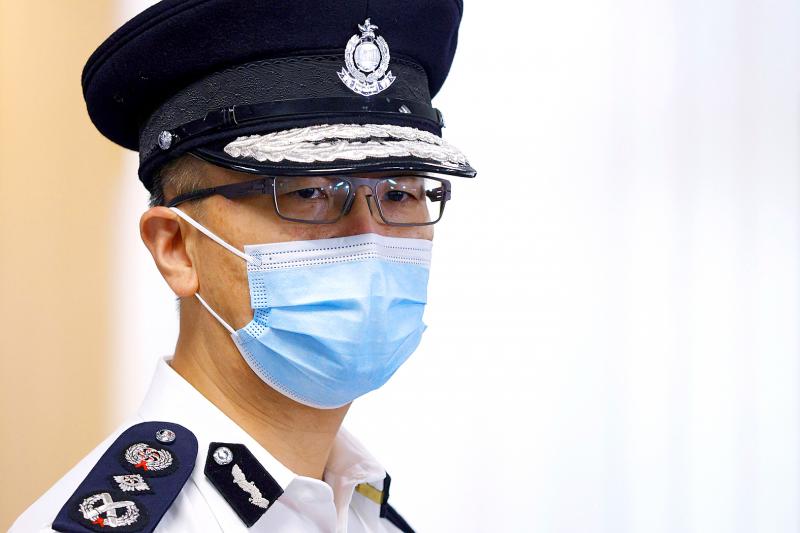Hong Kong’s new police chief has called for a “fake news” law to tackle “hostility against the police,” in what analysts see as an indication of the next phase of the crackdown on free speech in the territory.
“I understand that there are residents who are still hostile against us,” Hong Kong Police Commissioner Raymond Siu Chak-yee (蕭澤頤), 55, said at his first media briefing since taking office on Friday. “In this regard, I told my colleagues that many of these torn relationships and hostility against the police are due to fake news.”
“There is no legal definition of fake news at the moment, but if there is any legislation that could help us bring these people to justice, as law enforcers, we absolutely welcome it,” he added.

Photo: Reuters
The public image of the Hong Kong Police Force has been severely hit by pro-democracy protests that began in 2019.
Since the summer of 2019, support ratings for the territory’s once respected police force have plummeted, the Hong Kong Public Opinion Research Institute says.
Yet it was the talk of “fake news” amid the controversial closure of one of the territory’s most popular newspapers, Apple Daily, that alarmed critics.
They say that the label could be used to further muzzle dissent.
“The authorities are just adding more weapons into their pocket in order to stifle dissent,” said Chris Yeung (楊健興), a veteran journalist and a former Hong Kong Journalists Association chairman. “It looks very likely that this proposal of ‘fake news’ law will be put on the agenda in the next legislative session.”
Willy Lam (林和立), an adjunct professor at the Center for China Studies at the Chinese University of Hong Kong, worries that following last week’s closure of the Apple Daily, some less powerful and resourceful outlets might be the next target in an ongoing crackdown on free speech.
“The authorities have borrowed what mainland China is doing to penalize netizens critical of the government,” he said. “Independent journalism and media are facing a tough time in Hong Kong, and the situation may get worse.”
Hong Kong Chief Executive Carrie Lam (林鄭月娥) first floated the idea of “fake news” legislation in February, when she complained that misinformation had been on the rise since the mass protests of 2019 and the COVID-19 health crisis began.
Last month, Lam said again that she was considering the introduction of a “fake news” law to prevent “misinformation, hatred and lies.”
Shortly after that, the police sent a glossy pamphlet called “Know the facts: rumors and lies can never be right” to a few Hong Kong-based newsrooms.
Accompanying it was a letter addressed to editors, warning against “wicked and slanderous attacks” on the police.
In response to Lam’s remark, the International Federation of Journalists, a Brussels-based umbrella of media unions, said in a statement: “International experience has shown the problematic nature of such legislation, which further mires governments and courts in baseless cases and ultimately becomes a greater challenge to democracies at large.”

AIR SUPPORT: The Ministry of National Defense thanked the US for the delivery, adding that it was an indicator of the White House’s commitment to the Taiwan Relations Act Deputy Minister of National Defense Po Horng-huei (柏鴻輝) and Representative to the US Alexander Yui on Friday attended a delivery ceremony for the first of Taiwan’s long-awaited 66 F-16C/D Block 70 jets at a Lockheed Martin Corp factory in Greenville, South Carolina. “We are so proud to be the global home of the F-16 and to support Taiwan’s air defense capabilities,” US Representative William Timmons wrote on X, alongside a photograph of Taiwanese and US officials at the event. The F-16C/D Block 70 jets Taiwan ordered have the same capabilities as aircraft that had been upgraded to F-16Vs. The batch of Lockheed Martin

GRIDLOCK: The National Fire Agency’s Special Search and Rescue team is on standby to travel to the countries to help out with the rescue effort A powerful earthquake rocked Myanmar and neighboring Thailand yesterday, killing at least three people in Bangkok and burying dozens when a high-rise building under construction collapsed. Footage shared on social media from Myanmar’s second-largest city showed widespread destruction, raising fears that many were trapped under the rubble or killed. The magnitude 7.7 earthquake, with an epicenter near Mandalay in Myanmar, struck at midday and was followed by a strong magnitude 6.4 aftershock. The extent of death, injury and destruction — especially in Myanmar, which is embroiled in a civil war and where information is tightly controlled at the best of times —

China's military today said it began joint army, navy and rocket force exercises around Taiwan to "serve as a stern warning and powerful deterrent against Taiwanese independence," calling President William Lai (賴清德) a "parasite." The exercises come after Lai called Beijing a "foreign hostile force" last month. More than 10 Chinese military ships approached close to Taiwan's 24 nautical mile (44.4km) contiguous zone this morning and Taiwan sent its own warships to respond, two senior Taiwanese officials said. Taiwan has not yet detected any live fire by the Chinese military so far, one of the officials said. The drills took place after US Secretary

THUGGISH BEHAVIOR: Encouraging people to report independence supporters is another intimidation tactic that threatens cross-strait peace, the state department said China setting up an online system for reporting “Taiwanese independence” advocates is an “irresponsible and reprehensible” act, a US government spokesperson said on Friday. “China’s call for private individuals to report on alleged ‘persecution or suppression’ by supposed ‘Taiwan independence henchmen and accomplices’ is irresponsible and reprehensible,” an unnamed US Department of State spokesperson told the Central News Agency in an e-mail. The move is part of Beijing’s “intimidation campaign” against Taiwan and its supporters, and is “threatening free speech around the world, destabilizing the Indo-Pacific region, and deliberately eroding the cross-strait status quo,” the spokesperson said. The Chinese Communist Party’s “threats